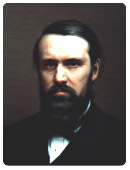Former justices

Justice Luther S. Dixon
Wisconsin Supreme Court Justice: 1859–1874Chief Justice: 1859–1874
Life: 1825–1891
"Justice Dixon...wrote a splendid opinion [In re: Booth] in support of the decision of the supreme court of the United States, proclaiming the supremacy of the federal laws and courts over those of the several states. This, of course, was not only sound legal reasoning, but it was the work of a fearless, courageous, intellectually honest judge." – John P. McGalloway, Wisconsin Supreme Court Centennial (1951)
Luther Swift Dixon was born June 17, 1825, in Milton, Vermont. He was educated at a military school in Norwich, Vermont. He then taught school and later studied law with a distinguished lawyer and politician. He was admitted to the Vermont Bar in 1850.
In 1851, Dixon moved to Portage, Wisconsin, and was twice elected as district attorney for Columbia County between 1851 and 1855. He was appointed judge for the 9th Judicial Circuit in 1858.
In 1859, Governor Alexander Randall appointed Dixon to fill the seat of the late Chief Justice Edward V. Whiton. At age 33, Dixon was the youngest chief justice to serve on the Wisconsin Supreme Court and remains so today.
While on the Supreme Court, Dixon was involved in the Ableman v. Booth (1854) controversy. In 1859, the U.S. Supreme Court reversed the Wisconsin Supreme Court's 1854 ruling that the Fugitive Slave Act was unconstitutional. Dixon and his colleagues, Chief Justice Orsamus Cole and Justice Byron Paine, grappled with their duty of filing the U.S. Supreme Court's mandate. Paine did not vote since he was a lawyer in the original action. Cole voted not to file the mandate and Dixon, who concluded that the U.S. Supreme Court had the power to reverse the state court, voted to file the mandate. Dixon feared that if a state could overrule the federal government, it could render the federal government ineffective. However, no action could be taken with the Wisconsin Supreme Court divided. To this day, the mandate has not been filed.
Months after writing the Booth opinion, Dixon faced election to the bench and won by a narrow margin. He was re-elected in 1863 and resigned in 1874 to practice law, which was more lucrative than his judicial salary of $2,500 a year. Even in those days, $2,500 was meager and justices had to borrow to meet living expenses. It was widely known that Dixon had financial difficulties and needed to earn more money to pay off personal debts.
During the next five years, Dixon declined a Republican nomination for the U.S. Senate, served as counsel for the Wisconsin railroads, participated in cases concerning railroad regulations and served as prosecuting counsel for the federal government in the "Whiskey Ring" scandals of 1874 and 1875.
Dixon had health problems which forced him to move to Denver, Colorado, in 1879. He returned to Milwaukee in 1891 and died December 6 of that year.

